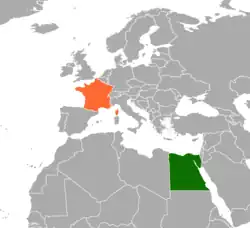French language education in Egypt
French language education in Egypt has been present since the 19th century when French was the lingua franca of the Egyptian elite. Since then, it has evolved, reflecting shifts in Egypt's socio-political environment and international relations. Today, French is the second most taught foreign language in Egypt, after English, and is a prominent feature of the country's education system.

History
French language education began in Egypt during the era of Ibrahim Pasha.[1] Recognizing the strategic importance of the French language for Egypt's modernization, he sent Egyptian students to France to learn the language and bring back modern technical skills. French influence was further reinforced during the Suez Canal construction, which attracted French engineers and workers to the country.[2][3]
During the 19th and early 20th centuries, French language and culture became highly influential among the Egyptian elite. French schools, such as the Lycée Français du Caire, founded in 1906, and the Collège de la Sainte Famille, founded in 1879, became the educational institutions of choice for the upper class.[4]
Following the Egyptian Revolution in 1952, the government sought to promote Arabic and English over French. However, the prestige associated with French education persisted, and French schools continued to attract students from all social classes.[5][6]
Contemporary status
In the modern era, French language education is still a prominent part of the Egyptian education system. It's estimated that over 50,000 students are studying in French schools across Egypt, and French is taught as a second language in many other schools.[7]
Several institutions, such as the French University in Egypt (Université Française d'Égypte), established in 2002, offer programs entirely in French, spanning disciplines from engineering to arts and humanities. The French Institute in Egypt (Institut français d'Égypte) also plays a significant role in promoting French language and culture.[8]
Cultural impact
French language education has fostered a unique Francophone community within Egypt and contributed to the development of a hybrid culture that combines elements of French and Egyptian traditions. This cultural fusion is particularly visible in areas such as literature, cinema, and the arts of the modern-day Egypt.[9]
Challenges and future prospects
Despite its historical prominence, French language education in Egypt faces several challenges. The growing global importance of English has led to a decline in the perceived value of French education. Furthermore, the cost of French schooling can be prohibitive for many families.[10]
However, there are promising signs for the future. The French government has shown a renewed interest in promoting French language education worldwide, including in Egypt. Furthermore, many Egyptians continue to value the benefits of a French education, such as critical thinking skills, cultural awareness, and access to opportunities in Francophone countries.[10]
In conclusion, French language education in Egypt is a vibrant and complex phenomenon, shaped by historical, socio-political, and economic factors. It continues to play a significant role in Egypt's education system and cultural landscape, contributing to the country's rich multicultural heritage.[10]
See also
External links
References
- Kendall, Elisabeth (2002-12-31), "15. Between Politics and Literature: Journals in Alexandria and Istanbul at the End of the Nineteenth Century", Modernity and Culture from the Mediterranean to the Indian Ocean, 1890-1920, Columbia University Press, pp. 330–343, retrieved 2023-05-12
- Karabell, Zachary (2004). Parting the Desert: The Creation of the Suez Canal. Vintage. ISBN 037570812X.
- Peters, Erin A. (2009). The Napoleonic Egyptian Scientific Expedition and The Nineteenth-Century Survey Museum. Seton Hall University.
- Gillispie, Charles Coulston (December 1989). "Scientific Aspects of the French Egyptian Expedition". American Philosophical Society. 133, No. 4: 447–474.
- Mujani, Wan Kamal; Karimah, Napisah (October 2012). "The social impact of French occupation on Egypt". Advances in Natural and Applied Sciences. American-Eurasian Network for Scientific Information. 6 (8).
- Prakash, Archana (2018-07-04). "Reappraising the French role in nineteenth-century Egyptian education". Middle Eastern Studies. 54 (4): 537–554. doi:10.1080/00263206.2018.1441147. ISSN 0026-3206.
- "Egyptian-French historical, contemporary relations". EgyptToday. 2017-10-23. Retrieved 2023-05-12.
- Editors, Charles River (2018). The Egyptian Scientific Institute: The History and Legacy of the French Expedition Established by Napoleon Bonaparte to Study Egypt. CreateSpace Independent Publishing Platform. ISBN 171885742X.
{{cite book}}:|last=has generic name (help) - TASCHEN (2007). Description de L'Egypte (in French). TASCHEN. ISBN 382283775X.
- UNESCO (2015). Rethinking education: towards a global common good?. UNESCO. ISBN 978-92-3-100088-1.